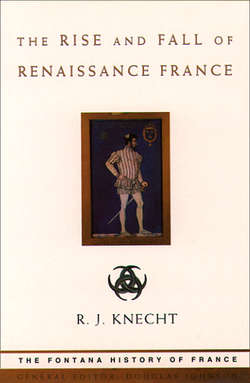Читать книгу The Rise and Fall of Renaissance France - R. Knecht J. - Страница 47
Scholasticism
ОглавлениеThe Faculty of Theology of the University of Paris was, by virtue of its teaching, the preaching of its masters and the doctrinal judgements of its assembly, the sovereign interpreter of dogma. All its learning was drawn from the Bible, the only source of divine knowledge, and Lombard’s Book of Sentences. However in the fifteenth century all notion of a critical study of Scripture had been lost. A decision of the council of Vienne of 1311 that oriental languages should be taught in the principal European universities had been ignored, so theologians were unable to read the Old Testament in the original Hebrew or the New in the original Greek. They were content instead with the quadruple method of exegesis: historical, allegorical, analogical and tropological. In applying this method they preferred the interpretations of medieval scholars, like Nicholas of Lyra, to those of the early church fathers. Above all they relied on the Book of Sentences, a compendium of answers to metaphysical and ethical problems written in the twelfth century.
The Faculty of Arts regarded Aristotle’s writings as the fount of all knowledge, but, as the Parisian masters knew no Greek, they had to rely on mediocre Latin versions. They used the gloss by Averroes, the twelfth-century Arab philosopher, to build up their own theories on the world and on man. Outstanding among thirteenth-century doctors at the university was St Thomas Aquinas, whose philosophy was largely shaped by Aristotle’s metaphysical writings. In his judgement, knowledge of God was attainable through reason with the assistance of Scripture and the traditional teaching of the church. However, the certainties inherent in his teaching were challenged by Duns Scotus (c. 1265–1308) and, more recently, by William of Ockham (c. 1285–1347). The latter denied that spiritual concepts could be grasped merely through reason. Divine truth, in his opinion, lay beyond the reach of the human intellect; obscurely expressed in Scripture, it was held in trust by the church and could only be apprehended through its teaching.
The new doctrine, called Nominalism as distinct from the Realism of Aquinas, seemed to demote knowledge into a mere study of ideas and for this reason it was twice condemned by the University of Paris, but during the second half of the fourteenth century it managed to gain dominance. The Nominalists, instead of building on Ockham’s ideas, were content merely to repeat them. They even narrowed their scope, withdrawing into a study of formal logic that was both abstract and sterile. They created a new philosophy, called Terminism, which became for the sixteenth-century humanists the epitome of intellectual backwardness and confusion. The triumph of Nominalism effectively paralysed the study of theology in the university. Christianity was reduced to a collection of affirmations that had to be accepted without thought or love, and the Christian life to the observance of formal practices and performance of good works.
By the second half of the fifteenth century the University of Paris no longer had the philosophical mastery which for three centuries had been its glory and pride. It seemed uninterested even in publishing the works of its greatest doctors. Scholars who wanted them had to turn to printers outside France. Biblical studies also languished. The first Bible to be printed in Paris appeared in 1476, twenty-five years after Gutenberg’s Mainz edition. Studying the Bible occupied less of the working time of teachers and students of theology than debating Lombard’s Sentences. Nor did patristic studies make up for the poverty of speculation. The Parisian presses largely neglected the writings of the Fathers. Theologians seemed interested only in the Immaculate Conception, a doctrine that had gained wide popular currency since the thirteenth century.
